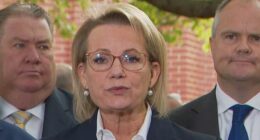Share this @internewscast.com
On Thursday, Lisa Cook initiated legal proceedings against President Trump to contest her termination from the Federal Reserve’s board of governors, a lawsuit that may redefine how the White House interacts with the nation’s central bank.
Cook, appointed to the Federal Reserve board by President Joe Biden in 2022, lodged her lawsuit in a Washington federal court after Trump publicized her removal on social media, citing purported mortgage fraud linked to her 2021 home loan applications.
These allegations emerged from Bill Pulte, head of the Federal Housing Finance Agency, who also brought them to the attention of the Justice Department.
In his dismissal letter, the president stated, “The Federal Reserve plays a crucial role in setting interest rates and overseeing financial institutions. It is essential for the American public to fully trust the integrity of those shaping policy and managing the Federal Reserve. Considering your suspected fraudulent behavior on a financial matter, both the public and I lack trust in your integrity.”
The lawsuit is perceived by many as a significant challenge to the independence of the Federal Reserve, a fundamental element of U.S. monetary policy for years. According to legal experts, the case is likely to proceed to the Supreme Court, where it might set new standards regarding presidential authority over independent agencies.
Cook’s court documents assert that Trump did not possess the legal power to remove her without adhering to the “for cause” criteria that federal law stipulates. Her legal team insists that such a removal requires procedural due process and substantiated findings, neither of which had been met prior to the president’s social media announcement. However, there is a notable lack of precedent regarding a “for cause” dismissal of a senior government official, particularly within the Federal Reserve.
When the “for cause” standard was reinstated in 1935—after being removed two years earlier—lawmakers declined to adopt more stringent language that would have explicitly required notice or hearing. Similarly, the law does not enumerate specific causes—such as the inefficiency, neglect of duty, and malfeasance in office—found in other statutes. Some legal experts believe this “naked” for-cause threshold gives the president more discretion when it comes to removing officials.
“This action is baseless and lacks both legal and factual merit,” said Abbe Lowell, Cook’s attorney, noting that the mortgage transactions in question occurred before her confirmation and had been disclosed during her Senate vetting process.
The Federal Reserve issued a statement emphasizing that governors serve 14-year terms specifically designed to insulate monetary policy from political pressure. The central bank said it would comply with any court ruling while defending the institutional protections that have underpinned its independence.
Recent Supreme Court rulings have weakened job protection for the heads of independent agencies, with the court frequently finding that “for cause” requirements unconstitutionally encroach on the president’s authority to direct the executive branch. In a case unrelated to the Fed, the Supreme Court indicated in May that it might treat protections for central bank officials differently, citing the long tradition of independent national banks as marking the Fed apart from other agencies.
Because those cases were typically brought by third parties who argued that a regulatory agency whose head was protected by a “for cause” removal provision was unconstitutionally structured, they did not give the court occasion to opine on questions of what amounts to sufficient cause for removal.
Financial markets showed little immediate reaction to the dispute, reflecting the fact that removing a single Fed governor will not significantly alter the course of monetary policy.
If Cook prevails, future presidents might feel barred from dismissing Fed officials regardless of the justification, potentially undermining confidence in the institution’s credibility. Critics of the White House say that if Trump prevails, Cook’s firing could stir concerns about the independence of the central bank.
















